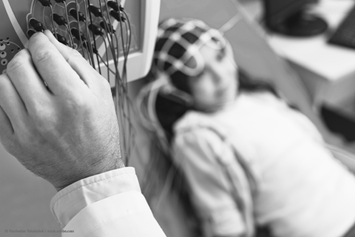Psychogenic Non-Epileptic Events (PNEE)/Functional Seizures (FS)
Psychogenic non-epileptic events (PNEE), or functional seizures (FS), are a type of neurological disorder. During these, it will look like your child is having an epileptic seizure, but they are not. These are not dangerous and won't hurt your child.
What Are Psychogenic Non-Epileptic Events (PNEE)?
Psychogenic non-epileptic events (PNEE), or functional seizures (FS), look like epileptic seizures. They can also be called psychogenic non-epileptic seizures (PNES). They are a type of functional neurological disorder (FND).
- During the event, your child is not able to control the way their body moves, senses things, or thinks.
- PNEE/FS are not caused by electrical problems in the brain like epileptic seizures are.
- PNEE/FS are real, serious events. They may look scary, but are not life-threatening. They don’t hurt your child’s brain. Your child isn’t faking the event.
- Children with epileptic seizures may also have non-epileptic events. Talk to their neurologist about how to respond to each the right way.
Why and How PNEE/FS Develop
PNEE/FS are thought to have biological, psychological, and social roots. We may not be able to find a cause for your child's PNEE/FS. There are many factors involved.
- Biological factors - epilepsy, anxiety, depression, migraine headaches, other mood disorders, other neurological conditions
- Psychological factors - worrying a lot or feeling overwhelmed
- Social factors - death in the family, divorce or family problems, bullying or problems with friends, problems with school or sports
Early Warning Signs
Right before an event, your child may have:
- Shaking arms. legs, or body (tremors)
- A tight feeling in their chest
- Light-headedness
- A headache
- Changes in breathing
How PNEE/FS Is Diagnosed
- The doctor or health care provider needs to find out if your child’s events are due to PNEE/FS or another neurological condition like epilepsy.
- They will ask you to describe what happened before, during, and after your child’s event and where it took place. Tell them as much as you can about what you saw.
- If you have a video of your child having an episode, bring it for their doctor or health care provider to review.
- Your child may have an electroencephalogram (EEG). It can be used to diagnose PNEE/FS and see an event while it happens. Sometimes it’s hard to know if an event is an epileptic seizure or PNEE/FS. If it’s not clear, the neurologist may order an EEG study.
- An EEG is painless. It records the brain’s electrical activity (brain waves). For this test, small, round, sticky discs (electrodes) are put on your child’s head. Wires from the electrodes attach to a computer that records the brain electrical activity (Picture 1).
- If your child has an event during the test with abnormal brain activity, it’s an epileptic seizure. If there is no abnormal brain activity, it may be PNEE/FS.
- If your child does not have an event during the test, PNEE/FS may still be diagnosed based on their medical history.
- Your child may see a mental health provider to check for what triggers their symptoms.
How PNEE/FS Is Treated
- The treatment goals for your child are to:
- Stop the events from happening again.
- Learn the early-warning signs.
- Learn ways to manage overwhelming feelings better.
- Find what triggers the events.
- Learn ways to control the event, like deep breathing.
- Cognitive behavioral therapy (CBT) is the main treatment for PNEE/FS. The neurologist will refer your child to a mental health provider who uses CBT.
- Medicines are not used to treat PNEE/FS. If your child also has anxiety or depression, medicine may help with those symptoms.
- If your child does not have epilepsy, they will stop taking all epilepsy medicines. They won’t help with their PNEE/FS.
How to Respond
- If an event starts, move your child to a quiet area, like a bedroom or the school nurse’s office.
- Don’t talk to your child during an event. The event will pass faster when it’s quiet.
- Take away anything that may distract your child. Turn off the TV. Have other people leave the room.
- Have your child take deep breaths to calm their body. They should breathe in slowly through their nose while counting to 5, then slowly breathe out through their mouth while counting to 7.
- Remain calm. Remember, these events are not hurting your child’s brain.
- Only call 911 or go to the hospital if the event looks very different from the others and doesn’t stop.
Going to School
- If your child hasn’t been going to school because of PNEE/FS events, they should go back as soon as possible.
- Your child’s doctor or health care provider can give the school information about PNEE/FS so staff can safely help them.
- School staff needs to respond to the events the same way you do. Tell them about your child’s early warning signs and the best ways to help them during an event.
Returning to Activities
- It is safe for your child to return to other activities like playing sports or spending time with friends.
- If your child drives, we recommend they not drive a car until they have been able to control the events for at least 3 months.
Helping Hands™ Patient Education Materials
Helping Hands™ are easy-to-read guides about different illnesses, therapies, surgeries, and more. They’re created by the Patient Education team at Nationwide Children’s Hospital and are reviewed and approved by clinical staff, like nurses, doctors, pharmacists, and psychologists. Nationwide Children's Hospital is not responsible for misuse of information in patient education materials, including Helping Hands.
HH-I-384 | ©2015, revised 2024, Nationwide Children’s Hospital


